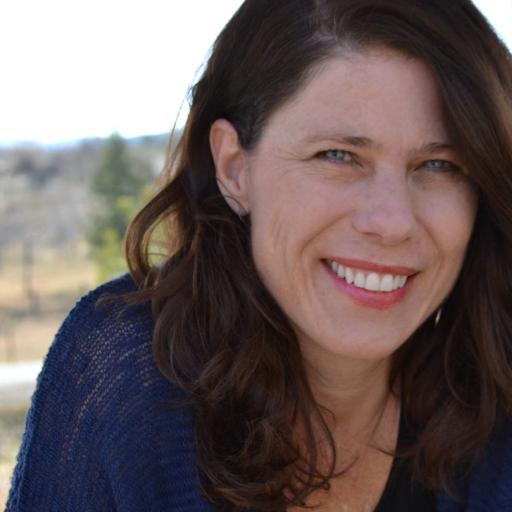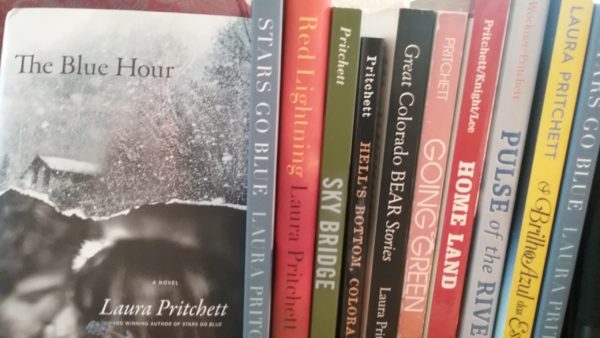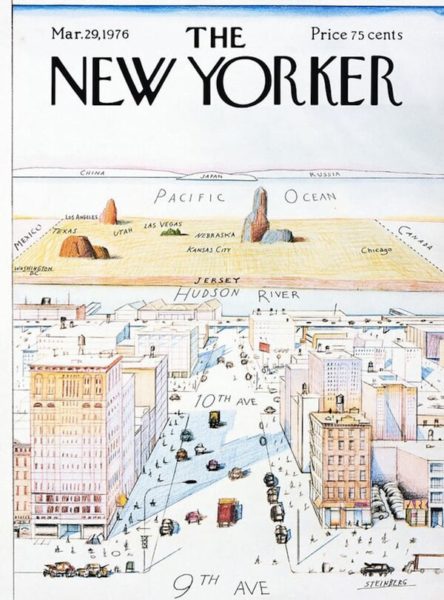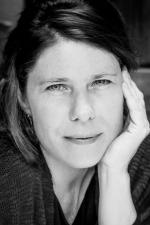
13 Jul Authors Uncovered: Laura Pritchett & “The Blue Hour, Telluride Art’s HQ, 7/17
Meet Laura Pritchett at the Telluride Library on Monday, July 17, 7 p.m., for Authors Uncovered, an event co-sponsored by the Telluride Library and Between the Covers Bookstore. Listen to her talk about “The Blue Hour,” a story of desire and passion in all forms, including violence, and contemporary Western writing in general. And while, ahem, baring it all, Pritchett’s “Great Colorado Bear Stories,” is also part of the program. “Bear Stories” looks at the state’s bears, including grizzlies, which once roamed here and the black bear, which still does – as Telluride locals know all too well.
“Dedicated to the mountains/the people who live among them/and lovers of all kinds/everywhere.” (From “The Blue Hour” by Laura Pritchett)

Award-winning author Laura Pritchett.
Blue.
Synonymous with the Western sky.
Which rivals Titian’s palette.
Blue.
The color is often aligned with a dark mood.
And with the moon.
Blue.
As in as cold as ice?
“Just as orange is red brought nearer to humanity by yellow, so violent is red withdrawn from humanity by blue. But the red in violet must be cool, for spiritual need does not allow of a mixture of warm red with cold blue,” wrote artist/philosopher Kandinsky in “Concerning the Spiritual in Art.”
Yes, but blue can be so cold it’s hot – as in the movie which premiered at the Telluride Film Festival in 2013, “Blue is the Warmest Color,” all-caps erotica.
When twined with movies and books, “blue” is aligned with naughty, but nice: X-rated (or close).
Naughty but nice also rhymes with Laura Pritchett, an award-winning author with a reputation for writing – and teaching how to write – great sex scenes.
“For years, a decade at least, as I was working on this novel, I also paid serious attention to mainstream literary writers. You know, who was writing sex scenes well, and who was doing it poorly? What made one sex scene moving and another laughable? Who was writing about sex as it really is—not just wonderful orgasmic stuff, but the sometimes-mundane, irritating, boring, frustrating, hurtful, or, yes, lacking thing it can be?,” the author explained.
Intrigued? Meet Laura Pritchett at Telluride Arts’ HQ, on Monday, July 17, 7 p.m., at an event co-sponsored by the Telluride Library and Between the Covers Bookstore.
Sip some wine and listen to the author talk about “The Blue Hour,” a story of desire and passion in all forms, including violence, also Western writing in general. And while, ahem, baring it all, Pritchett’s “Great Colorado Bear Stories,” is also included in her narrative. “Bear Stories” looks at the state’s bears, including grizzlies, which once roamed here and the black bear, which still does – as Telluride locals know all too well.
Pritchett remains in town to lead a workshop about nature working, most likely at the Telluride Library, Tuesday, August 18, 10 a.m. – noon. The class is free, but pre-registration is required.
“The Blue Hour” flashes the many shades of blue described above. Which makes sense because it was written by a woman who suggested in a recent interview, she might be blessed with a curious condition known as synesthesia (like Kandinsky): senses mingle due to cross-wiring in the brain. Hearing a musical note, for example, might cause a person with synesthesia to see a particular color: C as red; F sharp as blue.

“‘The Blue Hour’,” explained Pritchett, “is a book of love stories. Emotions come to me in color.”
“The Blue Hour” is set in a contemporary fictional Colorado mountain town, where community members find their paths twisting and colliding after a tragedy triggers seismic changes in each of them. Stunned, their response is to react by charging into their lives with renewed vigor, exploring the seductive landscapes of passion, obligation, and love. “The Blue Hour” digs deep into the hard edges of yearning and loneliness, “the long road of desire,” and the unexpected paths of mourning and lust.
The “blue” in the title also refers to the “Hour of the Wolf,” the Twilight Zone, the period of dusk just before dark when everything seems to change, but the shape of things to come remain vague and mysterious.
The book is also a prime example of what Western writing means today, a loaded statement and here’s why.
View of the World from 9th Avenue is a classic map/illustration showing how Manhattanites tended (tend?) see the rest of the world. Designed by cartoonist Saul Steinberg, it was first published as the cover for the March 29, 1976, edition of The New Yorker.

In total five cities beyond New York are included. New Jersey is pictured just beyond the Hudson, but is nothing more than a strip of land. Washington DC (near Mexico), Los Angeles, Las Vegas, Kansas City and Chicago. Texas, Utah, and Nebraska also make it onto the map – but barely. The rest of the United States don’t even warrant a mention.
The response to that image, the Way It Is for many Right Coasters even today, an ululation of sorts, continues to reverberate in writers like Pritchett. In response to the November election – that is, once she was able to breathe again – she had this to say:
“…Now that I’m actually experiencing this particular sensation, I’ve begun to wonder about the role of books, of bookstores, of publishers who promote voices that illuminate terrible truths, show paths of resistance, and instigate change. I also feel an old and odd anger, one relatable to many in the West. It’s a worn-out whine: Our voices and stories aren’t heard by those the publishing houses of New York or the TV studios of Hollywood, and, if they are heard, we are still being mythologized and romanticized—and if there’s one thing I do understand about the red swath of the middle of America, it’s that it feels overlooked and misunderstood.”
And in an interview on Paperback Radio, Pritchett admitted to sometimes feeling “isolated” as she just continues to “write away.”
“I am in love with literature,” Pritchett continued in that interview. “Literature is the love story of my life – in addition to my two children.”
But she is not overlooked or misunderstood by everyone.
The universal response to Pritchett’s latest book, “The Blue Hour,” is rapture. The author is widely praised as an honest observer of nature, human nature, and the human heart.
“In this deeply emotional and sensual novel, Pritchett reminds us that we can go on in bleak times and that even in dark moments there are sparks of joy and renewal. The residents of Blue Moon Mountain are reeling after the beloved but troubled community veterinarian kills himself during a snowstorm. Each character gets their own chapter and together their stories form a tapestry of a community blessed with love, compassion and humanity. Some people come together in lustful trysts, others accept familial obligations and still more forge bonds that may see them to the end of their days. Pritchett’s book will help you forget the turmoil in the world around us, and luxuriate in the glory of what it means to be simply and beautifully human,” raved PBS NewsHour.
“Desire, passion, and unexpected violence simmer in Pritchett’s dazzling new novel about the denizens of a tightly knit rural community grappling with a horrific tragedy. Graced with characters so alive, so full of quirky humanity, you miss them when you’ve finished the book, and written in prose as clear and gorgeous as a mountain afternoon, The Blue Hour isn’t just about the many ways love can end—it’s about how connection jumpstarts when you least expect it, too,” Caroline Leavitt, author of “Cruel Beautiful World” and the New York Times Bestseller, “Is This Tomorrow” and “Pictures of You.”
“Choose a book, any book: ‘Hell’s Bottom, Colorado’; ‘Sky Bridger’; ‘Red Lightning’; ‘Stars Go Blue’; or ‘The Blue Hour.’ They’re all fabulous (though ‘The Blue Hour’ may be my favorite)…Pritchett has won many book awards (including the High Plains and the WILLA), and…Pritchett works with traditional Western themes in sometimes subversive ways. I love the way Pritchett takes the lives of elderly ranchers, drug runners, undocumented immigrants, and rural veterinarians seriously. But most of all, I love the way her work foregrounds community narratives, in contrast to the ‘rugged individualism’ of the lone Western hero. By embracing a multiplicity of voices and focusing on the myriad connections—between people, people and animals, and people and the landscapes they love—that define life in the small towns of the West, Pritchett has come as close as any author I know to redefining the form,” said LitReactor.com in an article entitled “5 Bad-Ass Women Writing the West.”
“Beyond being set in Colorado and written by a Colorado writer, my novels are about humanity,” said Pritchett in that Paperback Radio interview. “There is a lot of sophisticated writing coming out of the West. Much of it not reviewed by the New York Times.”
Full disclosure: an ex-New Yorker myself – ie, Steinberg and I were once on the same page, err, map – I thought Western literature was an oxymoron. That is until my future husband Clint gave me a copy of Norman’s McLean’s “A River Runs Through It.”
So, as it turned out to my amazement, Western literature was not all Zane Gray-like, not all about an idealized American frontier starring a lone and lonely dude, handsome in a weathered sort of way, who always and forever blows into a town on his trusty steed to save the residents from bad actors of every shape and size. Then, of course, he rides off into the sunset, doffing his white cowboy hat as adoring throngs waving furiously bid him adiós and a fond farewell.
Move over Mr. Gray, Will James, and Louis L’ Amour. Make room for writers like Laura Pritchett, whose stories take dead aim at that mono-myth of the Old West, supplanting its sullen heroes with flesh-and-blood characters and giving Everyman a voice (at long last) in narratives set in the West of the here and now.
“The Blue Hour” was published on Valentine’s Day 2017 – February 14 is Pritchett’s birthday – because it is, in a way, it is a book of love stories. But more than that, it is about what it means to be human.
We live in the fuzzy outlines of dusk or the blue hour.
Until we finally see the light.
More about Laura Pritchett:

Award-winning author Laura Pritchett.
Laura Pritchett is the author of nine books.
She began her writing journey with the short story collection “Hell’s Bottom, Colorado,” which won the PEN USA Award for Fiction and the Milkweed National Fiction Prize. That was followed by the novels: “Sky Bridge,” “Stars Go Blue,” “Red Lightning,” and recently, “The Blue Hour.”
Pritchett is editor of three anthologies too: “Pulse of the River,” “Home Land,” and “Going Green: True Tales from Gleaners, Scavengers, and Dumpster Divers. “
She also has two nonfiction books: “Great Colorado Bear Stories” and “Making Friends with Death: A Guide to Your Impending Last Breath.”
Her work has appeared in The New York Times, O Magazine, Salon, High Country News, The Millions, Publisher’s Weekly, The Sun, Brain, Child, and many others.
Ptichett holds a PhD from Purdue University and teaches around the country.
She is also known for her environmental stewardship, particularly in regard to land preservation and river health.


Sorry, the comment form is closed at this time.